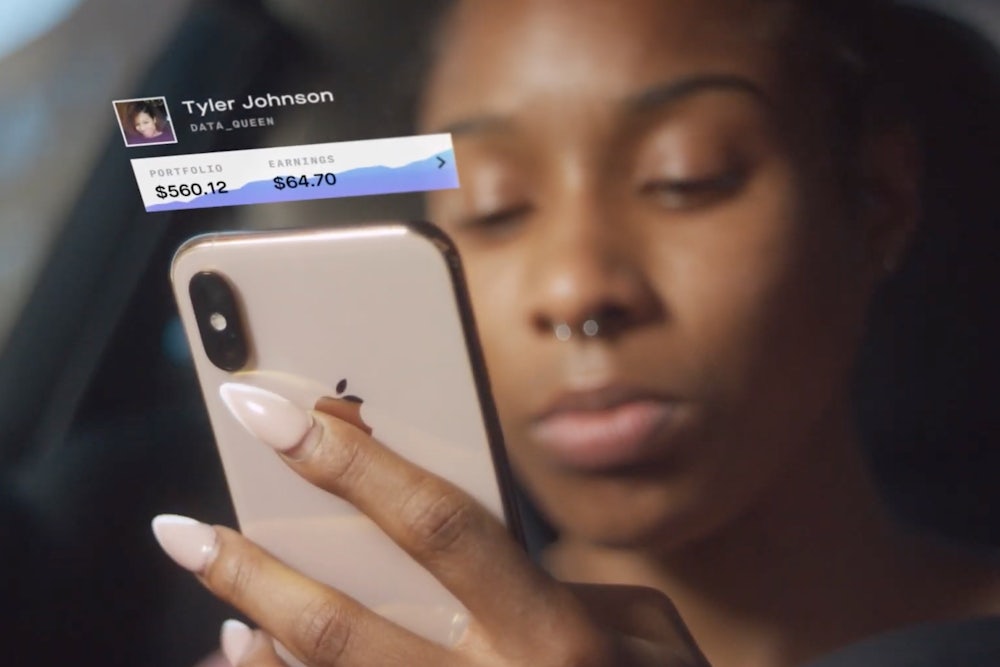If a person wanted to participate fully in the model of “wealth redistribution” the investment startup Delphia purports to be offering, this is what they would do: First, they would download the company’s app and grant it access to various categories of personal information. If they opted in for every conceivable kind of data Delphia says it desires, then the app, through a partnership with a third-party contractor, would be able to read their emails to collect metadata and receipts. Delphia could review their financial transactions and scrape their Twitter account, as well as track their location and look at their trades on the investment app Robinhood. Delphia’s website also implies that either now or sometime in the near future, the company would hoover up their browsing history and fitness data, too. Each time this person granted Delphia access to another app on their phone, they would be entered to win a weekly $10 million prize, a lottery in gratitude for helping the company make better bets.
This theoretical person, being an everyman interested in investing as a way to capture a share of the enormous wealth made on the stock market, which had until recently only been available to a select few, could also contribute at least $10 to Delphia’s fund. And if they did all that, the company would funnel their money into a series of investments determined by crunching the data the person had shared, along with the data from every other “contributor” to the app. Each individual user becomes a data broker, leveraging their own habits as valuable consumer insights, the ultimate quantification of the self. And because this is happening in the same year that a bunch of kids on Reddit made some money coordinating their purchase of GameStop shares, Delphia promises to wrestle control of vast fortunes from the suits on Wall Street and place them in the 99 percent’s hands.
I’m basing most of my information here on what Delphia says in promotional materials, since while I have absolutely no reason to believe the company would endanger my personal information, I also couldn’t quite bring myself to type my social security number into its app to verify my identity. I first learned about Delphia when a P.R. firm sent a series of aggressively friendly emails to one of my editors offering what I imagine would have been a trend story about the democratizing power of hedge fund apps, a framing that’s widespread across the financial technology sector but which finds a particularly extreme expression in Delphia’s conception of itself. “We founded Delphia to create meaningful prosperity by redistributing wealth to those whose data is creating economic value,” the startup’s website reads. Or as the company’s founder Andrew Peek told Fast Company, during a heavy press push in 2019, Delphia’s business is to erase the “investment advantage for the 1 percent,” which he said basically comes down to asking its users voluntarily to share the kind of data that Wall Street is already buying elsewhere, as a way to invest more accurately. This is only partially true, considering the data Delphia is collecting is probably much more specific and useful, which is also part of Delphia’s broader pitch.
As with pretty much any tech founder reimagining an extractive industry, Delphia’s business model relies on the assumption that the world is unfair because people don’t have enough middlemen with websites that parallax scroll: If only a business could act as an expedited bridge between people with resources or expertise and people without. With investing apps, that underlying assumption is particularly stark given Wall Street’s symbolism, each company promising to dismantle The System and give regular people with phones the opportunity to do whatever it is they imagine high-yield investors do.
Through the 2010s, the financial technology sector has pushed this narrative of equality particularly hard. In 2017, a remarkable interview between a representative of the notoriously exploitative management consulting firm McKinsey and Dan Schulman, the president and CEO of PayPal, posited that “democratizing” financial services “gave people hope”: “You can make managing and moving money a right for everybody, not just something for the elites,” Shulman said. But since members of the Wall Street Bets Reddit forum used the Robinhood app to drive up the price of GameStop shares earlier this year, concepts like “wealth redistribution” and “collective action” have been thrown around an awful lot. There are investing apps that round up the change from debit card purchases and place it in funds, and investing apps “for women by women” promising “financial wellness.” This summer, the actor Hill Harper launched The Black Wall Street, the app.
So far this year, investments in these kinds of businesses have already doubled last year’s numbers, which amounts, at last count, to $91.5 billion. Delphia itself has raised $19.5 million so far and says it’s managing $120 million in assets. Those assets include money from larger institutional investors, as well as sums collected from a no-fee program with the $10 minimum for everyone else: In Delphia’s model of “wealth redistribition,” the fees paid by institutional investors subsidize those of people who have more data than cash. During the GameStop meltdown in January, a series of staggering quotes appeared from new investors that were essentially bitter rehashes of the McKinsey interview’s central contention that making loads of money by gaming the system breeds solidarity and hope: “Literally everyone is on board” with the plan to invest in GameStop, said one Reddit user. “Left, right, Trump supporters, Trump haters. You want some unification movement? Well, this is it.” Another wrote that “instead of guillotines this time it’s beating them at their own game.”
But as with just about every free service funded by venture capital, Robinhood’s customers aren’t really the people who use it. They are the people who buy the data those customers generate—in Robinhood’s case, large investment firms that use that information to inform their own trades. It’s the kind of counterintuitive practice Delphia is relying on to present itself as an “ethical” alternative to the market as it exists, by disclosing that the company relies on user data and making that transparency the central appeal. But as Robinhood was successful in convincing some people that a data-mining operation can be a guillotine, Delphia is hoping to reimagine data collection as a righteous and canny capitalization on an infinitely renewable resource. In this line of thinking, the problem isn’t the finance industry or all the personal data that apps collect, or marketing customer interactions to firms that then use them to line the pockets of whoever can afford to invest; it’s that all of these things are being done by people who aren’t the users of Delphia’s app, and none of those practices are making the person thinking about giving their data to Delphia personally rich. As always, what the tech industry offers is a series of slight tweaks to a grotesque system, which amounts to an endlessly iterating loop.








